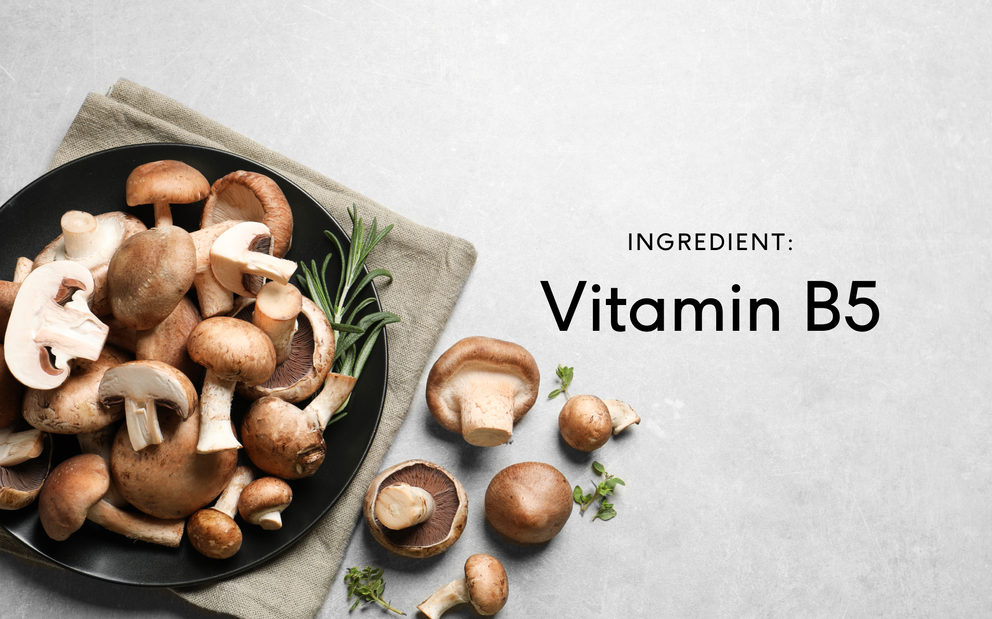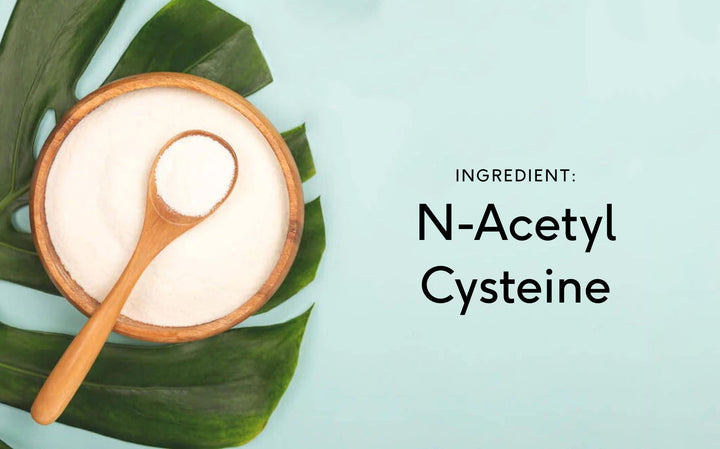Learn About Vitamin B5 in 5 Minutes
Table of contents

What is vitamin B5?
Vitamin B5, also known as pantothenic acid, is part of the B vitamin complex, and it’s one of the most important essential nutrients. This substance helps your body produce enzymes and hormones, and it’s essential to your neurological and cardiovascular well-being.
- Boosts your brainpower by generating more neurotransmitters
- Improves digestive system health by creating digestive enzymes
- Helps process other B vitamins for maximum absorption
- Lowers your cholesterol to keep your cardiovascular system healthy
- Helps your body produce hormones that are critical to your health
Why We Love Vitamin B5
Vitamin B5, also known as pantothenic acid, is an integral component of the B vitamin complex. Without vitamin B5, the rest of the B vitamins won’t work as well, and this nutrient has several special benefits that make it unique.
For example, vitamin B5 is highly involved in the production of hormones, enzymes, and neurotransmitters in your body. These special messengers and receivers tell your body what to do, and when they’re in harmony, your body can heal itself, prevent cell death, and work better across the spectrum. Vitamin B5 also helps your body maintain the right levels of cholesterol.
Pantothenic Acid is an integral component of the B vitamin complex, which is why Feel Multivitamin includes 10mg of Pantothenic Acid, providing 167% of your daily recommended intake.
Unbelievable Benefits of Vitamin B5
Over the years, research scientists have poured endless hours into learning more about vitamin B5. Here are some of their key results:
Neurological Benefits
Without enough vitamin B5, your brain won’t be able to make enough neurotransmitters. When you’re deficient in pantothenic acid, you may note brain fog or other mild neurological symptoms. In extreme cases, vitamin B5 deficiency may cause serious neurological conditions.
Due to its brain-supportive effects and influence over neurotransmitters, we've included 24mg of Pantothenic Acid in Feel Focus, 400% of your daily recommended intake.
Cardiovascular Benefits
Research clearly demonstrates that vitamin B5 reduces levels of cholesterol throughout your cardiovascular system. If left alone, bad types of cholesterol like LDL-C would contribute to the formation of plaque in your arteries, which leads to serious medical issues like strokes and heart attacks.
Skin Benefits
By creating various enzymes and hormones, vitamin B5 helps your skin cells reproduce and repair themselves, which prevents disease. Specifically, one study found that a serum with vitamin B5, vitamin B3, and vitamin E improved skin tone and reduced the signs of ageing in women. Another study determined that vitamin B5 reduces the symptoms of acne.
Diabetes Benefits
Vitamin B5 appears to reduce the symptoms of diabetes. According to scientific research, this nutrient is especially useful in relieving the symptoms of diabetic angiopathy, which is a condition that affects the heart. Even if you don’t have diabetes, this condition will protect your heart health, and it may also reduce your risk of diabetes.
Other Benefits
Pantothenic acid helps your body create a substance called coenzyme A (CoA), which is involved in hundreds of crucial bodily processes. Along with the other B vitamins, vitamin B5 transforms carbohydrates into glucose, which your body then uses to distribute energy to its various organs and tissues.
Without pantothenic acid, the other B vitamins would be hard for your body to process. Together, the members of the B vitamin complex help keep your hair, skin, brain, liver, and heart healthy.
Is vitamin B5 water-soluble or fat-soluble?
All B vitamins are water-soluble, and pantothenic acid breaks down quickly and doesn’t stay in your body for very long.
Where can vitamin B5 be found naturally? Common sources of vitamin B5:
Like all B vitamins, vitamin B5 is highly prevalent in organ meats such as beef liver. This nutrient is also present in shitake mushrooms, sunflower seeds, and other plant sources, and many grain and cereal products have been fortified with pantothenic acid and the other nutrients in the B vitamin complex.
5 foods/drinks containing vitamin B5
1. Beef liver 83% DV per 85g
2. Shitake mushrooms 52% DV per 1 cup or 128g
3. Sunflower seeds 48% DV per ½ cup or 64g
4. Avocado 20% DV per avocado
5. Potatoes 7% DV per one medium potato
What is the recommended daily intake for vitamin B5?
The Office of Dietary Supplements (ODS) within the National Institutes of Health (NIH), which is considered to be an authoritative source for nutrition information, has set the recommended daily amount (RDA) for vitamin B5 at 5mg for both men and women. Pregnant women need to consume 6mg of pantothenic acid per day, and lactating women need to consume 7mg.
What to consume to get a full daily dose of vitamin B5?
Beef liver - approximately 113g
Shitake mushrooms - approximately 2 cups or 256g
Sunflower seeds - approximately 1 cup or 128g
Avocado - approximately 5 avocados
Potatoes with skin - approximately 3kg
Can you absorb enough of vitamin B5 from food?
Like most B vitamins, it’s relatively hard to get your RDA of pantothenic acid from food. While many foods contain B vitamins in small amounts, credible nutrition authorities suggest that you should consume relatively high quantities of these nutrients to enjoy optimal health. To make sure you consume enough vitamin B5 to enjoy a long, healthy life, it might be best to get your RDA of this nutrient in a daily multivitamin.
Why is vitamin B5 necessary for your body?
Vitamin B5 improves the performance of the other B vitamins, and this nutrient also performs critical functions independent of the other substances in the B vitamin complex. For instance, pantothenic acid is necessary for the production of coenzyme A (CoA) and acyl carrier protein, which your body uses to synthesise and break down fatty acids.
Functions of vitamin B5
Neurotransmitter production: Vitamin B5 is essential for the production of many neurotransmitters.
Cholesterol reduction: Consuming enough vitamin B5 reduces the levels of LDL-C in your system, which is the most prevalent form of bad cholesterol.
Enzyme and hormone production: Pantothenic acid is vital for the production of hundreds of different hormones and enzymes.
Antidiabetic functions: Consuming enough vitamin B5 may reduce the symptoms of diabetic angiopathy, which is a diabetes symptom that affects the heart.
Symptoms of vitamin B5 deficiency
Numbness and Burning in Extremities
Severe pantothenic acid deficiency can result in a feeling or numbness or burning in your hands and feet.
Fatigue and Sleeping Disorders
Deficiency in vitamin B5 can cause severe fatigue that is usually paired with restlessness or insomnia. This combination of symptoms can rapidly lead to total exhaustion.
Digestive Dysfunction
Pantothenic acid deficiency can also cause diarrhoea, nausea, or vomiting.
How long do you need to take vitamin B5 to start experiencing its benefits?
As a water-soluble nutrient, ingested vitamin B5 takes effect almost immediately, so you may start to experience benefits straight away. However, it may take several weeks for full benefits to become noticeable.
Consistency is key and our research recommends taking your Feel supplements for at least 3 months to allow your body to adjust and provide the desired benefits.
How long does it take for your body to digest/absorb vitamin B5?
Like the other B vitamins, pantothenic acid is absorbed very efficiently. In most cases, your body absorbs close to 100% of the vitamin B5 you ingest within 24 hours or less.
How long does vitamin B5 stay in your body after you take it?
Pantothenic acid does not remain in any of your tissues for a significant period of time. Generally, you’ll excrete the pantothenic acid you consume within 24 hours.
Is vitamin B5 an antioxidant?
Scientists aren’t sure whether vitamin B5 is an antioxidant. At best, this nutrient might exert mild antioxidant functions, and its impact on oxidative stress and inflammation is likely minimal.
Can you overdose on vitamin B5? What are the effects?
The B vitamin complex, in general, displays a remarkably high safety profile, and pantothenic acid is one of the safest B vitamins. It’s practically impossible to overdose on vitamin B5, and if you do consume unreasonably high concentrations of this nutrient, your body will eliminate any excess pantothenic acid rapidly via urine excretion. All the same, it’s best to stick to your RDA of vitamin B5 to avoid overdose.
Does vitamin B5 dissolve, flush out, or build up in the body?
Pantothenic acid does not build up in your body, and this nutrient is rapidly excreted in your urine.
Can you take vitamin B5 during a diet?
There’s no reason you shouldn’t take vitamin B5 while you’re observing a diet. At the same time, vegans and vegetarians might have a hard time sourcing this nutrient from food.
Are there synthetic forms of vitamin B5?
Most of the types of B vitamins in supplements and enriched foods are synthetic. One common synthetic form of pantothenic acid is calcium pantothenate.
Why might synthetic forms of vitamin B5 be better?
Synthetic forms of pantothenic acid are easy to produce, which means they’re cheaper for producers and end consumers.
Absorption rate of synthetic vitamin B5
Producing pantothenic acid synthetically doesn’t appear to affect this substance’s remarkably high absorption rate.
Why might natural forms of vitamin B5 be better?
Natural vitamin B5 found in food is in the form of pantothenate, which your body then converts to pantothenic acid. While there aren’t any clear benefits of consuming natural pantothenate as opposed to pre-made pantothenic acid, it’s possible that something is lost in skipping this conversion process.
How to take vitamin B5
You can get the vitamin B5 your body needs in food or in supplements.
Vitamin B5 trends in medicine
Scientists have long noted that vitamin B5 appears to reduce the symptoms of acne, and in 2018, researchers got a step closer to understanding why. A study presented at the European Academy of Dermatology and Venereology indicates that pantothenic acid appears to boost the effects of doxycycline. This potent antibiotic is commonly used as a treatment for cases of severe acne.
Why everyone should be taking WeAreFeel supplements
If you don’t take enough vitamin B5, your health will suffer, and your ability to process energy and fats will decline rapidly. Here at WeAreFeel, we understand the importance of pantothenic acid, but we also recognise how difficult it may be to get your daily RDA just from food, so we've included all the amounts you need in Feel multivitamin!
Here’s the Proof
- B Vitamins and the Brain: Mechanisms, Dose and Efficacy—A Review
- Pantethine, a derivative of vitamin B(5) used as a nutritional supplement, favourably alters low-density lipoprotein cholesterol metabolism in low- to moderate-cardiovascular risk North American subjects: a triple-blinded placebo and diet-controlled invest
- The effects of a daily facial lotion containing vitamins B3 and E and provitamin B5 on the facial skin of Indian women: a randomised, double-blind trial.
- A Randomised, Double-Blind, Placebo-Controlled Study of a Novel Pantothenic Acid-Based Dietary Supplement in Subjects with Mild to Moderate Facial Acne
- Hypolipidemic effect of pantothenic acid derivatives in mice with hypothalamic obesity induced by aurothioglucose.
- Lowering effect of pantethine on plasma beta-thromboglobulin and lipids in diabetes mellitus.
- Pantothenic acid in health and disease.




















































 Back
Back





